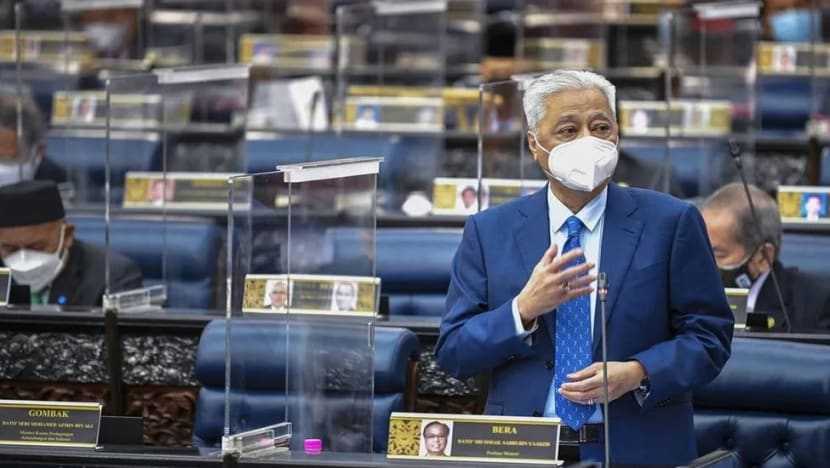12th Malaysia Plan: What you need to know about the 2050 carbon neutral goal and other green measures
28 September, 2021

Prime Minister Ismail Sabri Yaakob on Monday (Sep 27) tabled the 12th Malaysia Plan (12MP) in parliament, with a pledge for Malaysia to “become a carbon neutral country by 2050 at the earliest” listed alongside other measures to accelerate green growth.
In his parliamentary speech, he said although Malaysia only contributes 0.7 per cent of global greenhouse gas emissions, the government would continue to fulfil its commitment to reduce its greenhouse gas emission intensity of GDP by 45 per cent by 2030.
This would be based on the emission intensity of GDP in 2005, in line with the Paris Agreement in 2015. Greenhouse gas intensity is the ratio of a country’s emission to the economic value it generates.
“Today I am giving my commitment that Malaysia will become a carbon neutral country by 2050 at the earliest,” Mr Ismail Sabri said on Monday.
"Other details for carbon reduction measures will be announced after the strategic long-term review of the low-carbon development strategies has been finalised by the end of 2022,” he added.
Carbon neutrality means that any carbon dioxide released into the atmosphere is balanced by an equivalent amount being removed from it.
On paper, Malaysia’s carbon neutrality pledge appears to be the most ambitious in Southeast Asia.
Indonesia has pledged to achieve net zero emissions by 2060, while Thailand said that it is targeting to achieve carbon neutrality by 2065 to 2070.
Meanwhile, Singapore has announced that it would halve its 2030 peak greenhouse gas emissions by 2050, and to achieve net zero emissions "as soon as viable" in the second half of the century.
In tandem with Malaysia’s 2050 carbon neutrality aim, various policies to accelerate green growth would be put in place. Here are the key announcements:
NO NEW COAL POWER PLANTS
The prime minister pledged that the government would no longer build new coal-fired power plants.
He added that a comprehensive National Energy Policy would soon be introduced to provide a long-term strategic direction to support the aspirations of a carbon neutral nation.
"Cleaner electricity generation will be implemented through the operation of several gas power plants in Peninsular Malaysia to replace coal-fired power plants,” he said.
A law related to energy efficiency and conservation would be introduced to regulate energy consumption by high-intensity consumers in the industrial and commercial sectors, Mr Ismail Sabri said.
Renewable energy generation from solar, biomass and biogas is targeted to increase to 31 per cent of the total installed capacity in the country by 2025, he said.
Additionally, a total of 120 cities are expected to achieve sustainable city status by 2025.
CARBON PRICING
Mr Ismail Sabri said that economic instruments such as carbon pricing and carbon tax would be implemented. He did not go into the details.
Earlier this month, Environment Minister Tuan Ibrahim Tuan Man was quoted as saying by Bernama that a Domestic Emissions Trading Scheme (DETS) was being developed by the Environment and Water Ministry.
He said that the development of the trading scheme would be carried out jointly with the Finance Ministry, Bursa Malaysia and other stakeholders.
The minister said the government planned to implement DETS in phases and a single business platform would be developed.
State government authorities and the private sector could leverage DETS to execute carbon credit transactions at the domestic level. In comparison, trading in the international market would entail a high cost of transaction and more stringent technical requirements, he said, according to the Bernama report.
Emissions trading, as set out in Article 17 of the Kyoto Protocol, allows countries that have emission units to spare - emissions permitted to them but not utilised - to sell this excess capacity to countries that are over their targets.
Plans for a new global carbon exchange and marketplace that will be headquartered in Singapore have recently been unveiled.
Among other carbon pricing approaches, a tax may also be levied on greenhouse gas emissions in order to encourage polluters to reduce the combustion of fossil fuels.
In the case of Singapore for instance, it has imposed a carbon tax rate of S$5 per tonne of greenhouse gas emissions from 2019 to 2023. This is set to be increased in the future.
DEVELOPING ELECTRIC VEHICLE TECHNOLOGY
The Malaysian government would also give priority to the development of the energy-efficient vehicles (EEV) production industry to support environmentally friendly mobility initiatives, according to the prime minister.
Last week, Senior Minister Azmin Ali said in parliament that in order to support the electric vehicles (EV) ecosystem in the country, the Ministry of International Trade and Industry was identifying new strategies to promote the industry to investors.
The strategies included introducing a consumer-focused incentive package to attract investments into the EV ecosystem, he said, according to the Edge Markets.
"This measure is expected to encourage investments in the production of EVs or their components and infrastructure support, including EV charging stations, as well as to drive consumer demand for EV vehicles," he said.
BLUE ECONOMIC BLUEPRINT
Mr Ismail Sabri also said that the government would introduce a blue economic blueprint to determine the development direction of coastal and marine areas.
According to a 2015 report by Malaysia’s National Hydraulic Research Institute (Nahrim), sea levels have been rising by between 0.2mm and 4.4mm annually in the country since 2010 due to climate change.
Several projects under the flood mitigation programme, integrated river basin management, coastal erosion control as well as flood forecasting and warning at a cost of RM16 billion (US$3.82 billion) would be implemented under the 12MP and 13MP, the prime minister added.
An ecological fiscal transfer mechanism would also be improved to support the state government’s efforts in conserving the forest areas, he said. “Sanctuaries for endangered wildlife such as leopards, tapir and elephants will be upgraded for conservation purposes.”
Source: www.channelnewsasia.com
TAG(s):
